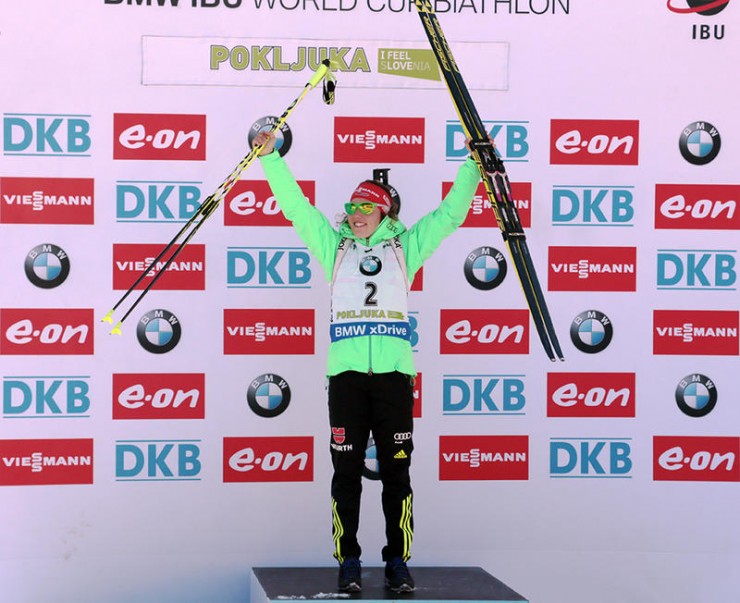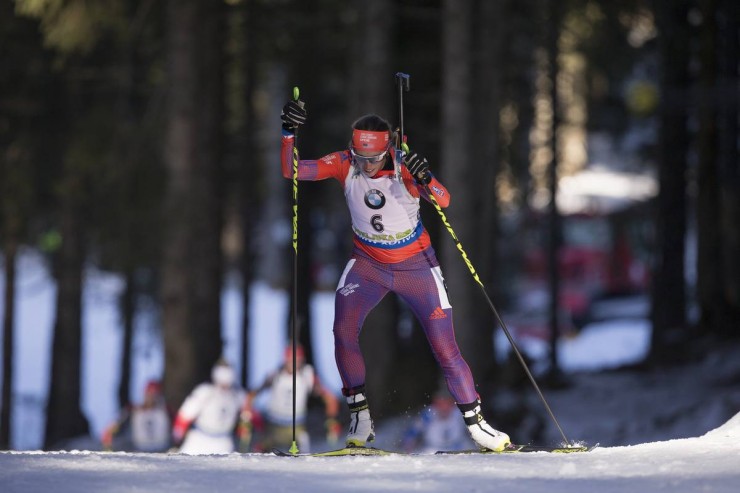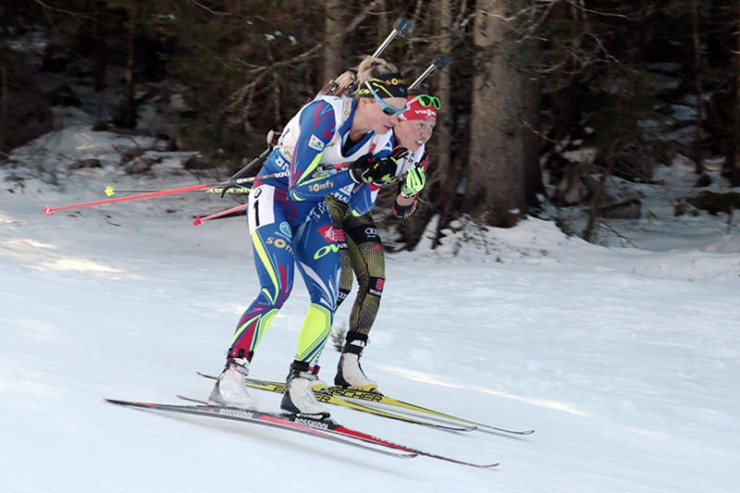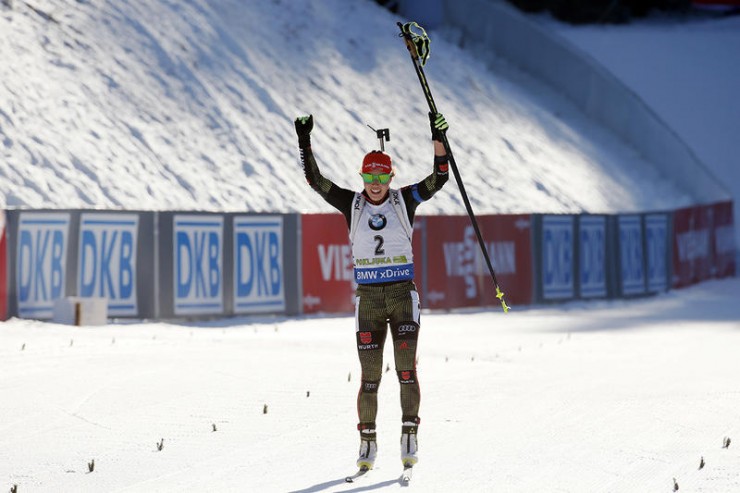
The IBU Biathlon World Cup season, and especially this weekend of races in Pokljuka, Slovenia, is shaping up more and more as a duel between German and French athletes at the top.
Just like Martin Fourcade and Simon Schempp battled it out on the men’s side, the women’s weekend was highlighted by close races between France’s Marie Dorin Habert and Germany’s Laura Dahlmeier.
In Friday’s sprint, Dorin Habert prevailed by just over a second. But after skiing together for most of the pursuit on Saturday, the positions on the podium were reversed and Dahlmeier was victorious, finishing first in 30:08.9 minutes, 18 seconds ahead of her French rival, just like she had publicly announced as her goal after the race on Friday.
In sunny and warm conditions on Saturday afternoon with almost no wind on the shooting range, the two athletes quickly established a sizable lead to the rest of the field, which kept growing until the finish as neither incurred a penalty lap in the four shooting stages.
Third place went to Finland’s Kaisa Mäkärainen, winner of the first pursuit of the season in Östersund, Sweden, who has since been struggling with her shooting accuracy. Mäkärainen missed just one target in her final stage in this race (0+0+0+1) and left the range in fourth, just behind the Czech Republic’s Gabriela Soukalová (0+0+1+0) in third. Mäkärainen was able overtake her on the last loop and finish 9.4 seconds ahead of her for the final step on the podium. Mäkärainen skied the fastest course time of 55 finishers.
“It’s very nice to be back on the podium,” Mäkärainen said in a post-race press conference. “I felt very good today and very happy about my range time. I hope to be back in the top five every competition, but most important are the World Championships in Oslo next March.”
After Gabriela Soukalová in fourth, Germany’s Franziska Preuss placed fifth, edging teammate Vanessa Hinz in sixth by 0.5 seconds. Both had only one penalty in the third shooting (0+0+1+0).

US Biathlon’s Susan Dunklee, who started sixth, 31 seconds behind Dorin Habert, hit 18 of 20 targets (1+0+1+0) and finished the day in 10th (+1:35.4).
“I realized halfway through the race that my typical greatest strength, my skiing, wasn’t quite in top form today,” Dunklee explained in an email. “Usually I move up through packs, but today big trains of people passed me and I had to let them go.
“Perhaps I overdid it in the second loop,” she added, referring to the loop where she posted the third-fastest course time. “Luckily I had another great day on the shooting range and that kept me in the race.”
Friendly Rivalry
Unlike in the men’s race where Schempp and Fourcade seemed to disagree about skiing tactics, not wanting to make the pace for each other, Dorin Habert and Dahlmeier skied together from the start and frequently exchanged in the lead in order to create a gap to the rest of the field.
“I was lucky that I could ski all four loops with Marie Dorin. I think we distributed that well, with her taking the first part of the round, and me taking the lead on the second part being faster out of the downhill,” Dahlmeier told the German TV broadcaster ZDF. “I think that was decisive. And then of course a zero [clean shooting] on the shooting range is still required.”
The crucial situation deciding the race happened on the third loop leading into the final stage, when Dorin Habert stumbled in soft snow in a sharp downhill turn, falling on her belly and just narrowly avoiding the V-boards on the edge of the track. She quickly got back up, and at the next split time, she was still only 7.4 seconds behind Dahlmeier.

“I don’t know what happened,” Dorin Habert said in an English interview with ZDF.
“I think I just made a wrong movement with my ski, and that’s why I was a few seconds late behind Laura, and I think that’s why I lost the win because of that. But no problems, it’s good to be second.”
In the press conference, she elaborated: “It was a stupid error. I made the wrong move with my skis,” she said. “Falling on a downhill is stressful, as it’s hard to come back to the race.”
In addition to the seconds Dorin Habert lost when she fell, Dahlmeier gained another advantage when she was able to hit her first targets before the French skier even reached the shooting mat. In previous shooting stages, Dorin Habert had put some pressure on the Dahlmeier by beginning and cleaning her targets first.
“I let her in front before the shooting range because we had zeroed our aim [before the race] on range 3 and 4 and the French on 1 and 2, and you always prefer to shoot there,” Dahlmeier said of another tactic. “I generally try to focus just on my own targets, clean the shots one by one. Of course you notice when the spectators are yelling [after a hit or miss], but I try to ignore that as much as possible.”
Both cleaned all targets for the fourth time, but Dahlmeier left the range 10.8 seconds in front of Dorin Habert, who was not able to catch up to her again on the last loop. Despite opening her ski pole straps and waiving to the crowd already on the final stretch, in the finish Dahlmeier expanded that lead, winning by 18 seconds.

Despite her mishap, Dorin Habert was not disappointed at all with second place.
“No, no, no, because we made a perfect race with Laura,” she told ZDF. “It was very exciting to compete with her all the time. I am very happy that my shooting was perfect, I always want to do races like that, and congrats to Laura.”
The two athletes hugged each other after the finish, exhausted but smiling.
“Today you had to run a smart race,” Dahlmeier said. “The strength is fading towards the finish, and this is the last block of races before Christmas.”
Despite the pursuit loss, Dorin Habert achieved a different kind of victory on Saturday by taking over the yellow bib as the overall women’s World Cup leader. She has 309 points after seven competitions, and is currently five points ahead of Soukalová, and she’ll wear the bib in Sunday’s mass start.
“I don’t want to compete tomorrow. It will be very hard. I hope to get a good sleep and perform well tomorrow,” Dorin Haber joked in the press conference. “Yellow is a very nice color, I like it a lot. I hope I won’t wear it just for one competition.”
10th for Dunklee
Dunklee finished the pursuit in 10th and seemed happy with that result, briefly pumping her right fist and later waiving to the many spectators in the arena that was filled to capacity. She recorded the 12th-fastest skiing time on the course among all athletes, but was most satisfied with her shooting with just two misses (1+0+1+0).
“Cleaning the last standing stage especially is extremely important in a pursuit,” Dunklee wrote. “I was pleasantly surprised to hear I was in tenth heading out on the last loop. I realized I had to fight hard early in that loop to dissuade Doro [Dorothea Wierer of Italy] from thinking she might be able to hunt me down.”
Her effort got rewarded, with Dunklee skiing the 10th-fastest final loop, and Wierer, who had already won a World Cup 15 k in Östersund this season, finishing 14 seconds behind her.
Biathlon Canada’s Julia Ransom, who achieved her best World Cup result of 31st in Friday’s sprint, held her position for a long time, then missed three shots in the final shooting (1+0+1+3), which set her back. After leaving the range in 47th, she finished 44th (+4:46.2).
One position and a second behind her in the finish was teammate Rosanna Crawford, who started the race in 23rd, but got off to a problematic start after missing four shots in the first prone. That put her in 54th heading into her second loop.
“My misses were all high but moving around, so not a group,” Crawford explained in an email. “I think I was maybe so focused on wanting to hit my standing shots that I didn’t give my prone enough thought and focus. It’s amazing how quickly you can go from thinking you are a good shooter to missing 4 in your first bout!”
She had two more penalties before the finish (4+1+0+1), yet steadily picked off racers along the way to end up 45th (+4:47.4).
“For the next 3 shootings I was mostly over it, I didn’t hammer the skiing, just thought of it as a good opportunity to work on some good ski technique and cleaning my standing,” Crawford wrote.
Canada’s third woman in the pursuit, Megan Tandy had a scare when she lost consciousness on the course. After starting in 51st position, she skied the 39th fastest time on the first loop, then had to ski three penalty laps after the first stage. Shortly after that on the second loop, she was seen on the TV broadcast suddenly collapsing to the ground on a fairly flat section, seemingly not caused by an obvious skiing error or contact with another athlete.
A bit later she was shown sitting on the side of the track, conscious and receiving attention from coaches and course staff. She could not finish the race.
“Unfortunately, my race ended unexpectedly early today when I lost consciousness on course, eek,” she later posted on Facebook. “While passing out on TV during the pursuit was a far cry from my idea of a “good day”, I can assure you that the footage looked much worse than it felt. Not to worry, I am already feeling much better and am being well taken care of. Thanks a lot to all the people who helped me out today. After a good Christmas break I will be ready to go again ☺”
In an email, she confirmed that she was unharmed by the incident: “I am really not sure what happened, I felt unwell skiing and a bit lightheaded, but I was just thinking to make it to the top of the hill so I could tuck and rest a second, and then I was aware of blackness closing in very fast – but I don’t remember falling at all,” Tandy wrote. “There were several people around me when I came to and they had already taken my skis and rifle off.”
She had not noticed any warning signs ahead of time: “Only that I was feeling exhausted and unwell during the race for a minute or two before. Other then that, no — I actually had a good ski performance yesterday and felt completely healthy and normal.”
This was only the second time she did not finish a race, she explained.
“I think I will be just fine, I am just taking it easy and feeling a bit weak / tired,” she wrote.
Most of the team plans to return to Canada on Monday for the holiday break.
Mass Start on Sunday
The weekend in Pokljuka concludes Sunday with the first mass start of the season, 10 k for the women and 15 k for the men. In this discipline, all participants start at the same time in 10 rows of three athletes each. The 25 best athletes on the World Cup total-point score standings at that time of the season are pre-qualified, plus five more athletes not among those top 25, who achieved the best results in the events that race weekend, make the cut.
Via this second criterion, Dunklee qualified for the women’s race, and is scheduled to start out of row 9 (bib 26).
“One more day left of full focus and full gas for the mass start. I know I will probably feel tired, but everyone else in the race will be exhausted from the past month so that shouldn’t be a big problem,” Dunklee wrote.
No other North American woman made the cut, though Crawford would be the first athlete on the “reserve standby list” in case another qualified athlete would not be able to start, for example due to illness.
“I thought I was a bit safer for the mass start in the overall World Cup standing, but I guess not,” Crawford wrote in an email. “Now I am sitting as first reserved for tomorrows race. So that’s disappointing. Looking forward to heading home and getting back to real winter and some family time.”
On the men’s side, Canadian Nathan Smith as well as Americans Tim Burke and Lowell Bailey qualified.
Harald Zimmer
Harald has been following cross-country skiing and biathlon for some 20 years since the Olympic Winter Games in Albertville and Lillehammer. A graduate of Middlesex University London and Harvard University, he now lives near the Alps where he likes to go skiing, snowboarding and hiking. He is a former track athlete in middle-distance running, as well as a huge NBA fan.



